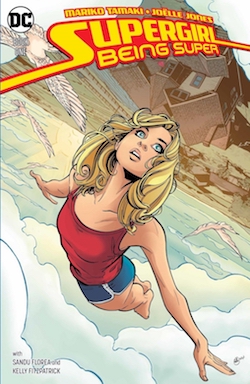Thursday Comics Hangover: Truth, justice, and popping pimples
Supergirl is a great character at her base, but she's been through so many permutations that it's hard for new fans to figure out where to begin with her. In the 1990s, she was a shape-changing interdimensional life form who had an affair with Lex Luthor. In the early 2000s, she was a sexualized fanboy's wet dream. In the 1980s, she was a perky aerobics instructor type who sacrificed herself to save the universe.
You can find a few stories from every period of Supergirl's long career that might appeal to wider audiences, but what about her origin? What about Supergirl is unique? What book explains her place in the universe without using her relationship to Superman as the primary measurement?

That's where Supergirl: Being Super, a new paperback collection written by Mark Tamaki and illustrated by Joëlle Jones, comes in. Being Super is an origin comic that reimagines Supergirl's story in the framework of a contemporary young adult novel, complete with pimples, high school friendships, and a confident main character who struggles to find her place in the world.
Jones is one of the most gifted superhero artists at work today. Her Supergirl is dynamic and distinctive, a tall and occasionally gawky young woman who carries all her worries and her joys plainly on her face. She looks and carries herself like a high school student, unlike most of the recent incarnations of the character.
Tamaki fills in details to Supergirl's origin that other writers never bothered to consider. Her adopted father is gruff and more than a little controlling, but sweet deep down, like a cross between Ron Swanson and Pa Kent. Her friends are the kinds of good people that a superhero would want in her life: thoughtful and kind and inspirational. Poignant moments, like a kid sister reading a goodbye letter during a high school student's funeral, are moving without being maudlin. It's a fully-developed world, and the plot examines Supergirl as a decent character without making her unbelievable. (This is the best way to handle Super character, as I've written.)
That said, Being Super does fall into a few of the traps that have befallen Superman comics over the last few years. There's way too much time spent on Kryptonian culture and history, for one thing. Nobody cares about Krypton; Krypton is useful only as the reason for Superman and Supergirl's powers, and the less you dwell on it the better. And the plot is stretched a little too thin in the first two thirds of the book and jumbled up a little too thick in the last third.
But this is the best origin that Supergirl has ever gotten, and I hope Tamaki and Jones get to revisit this world sometime soon. Readers deserve a solid run on the character to consider as canon, and Being Super makes for a great start.